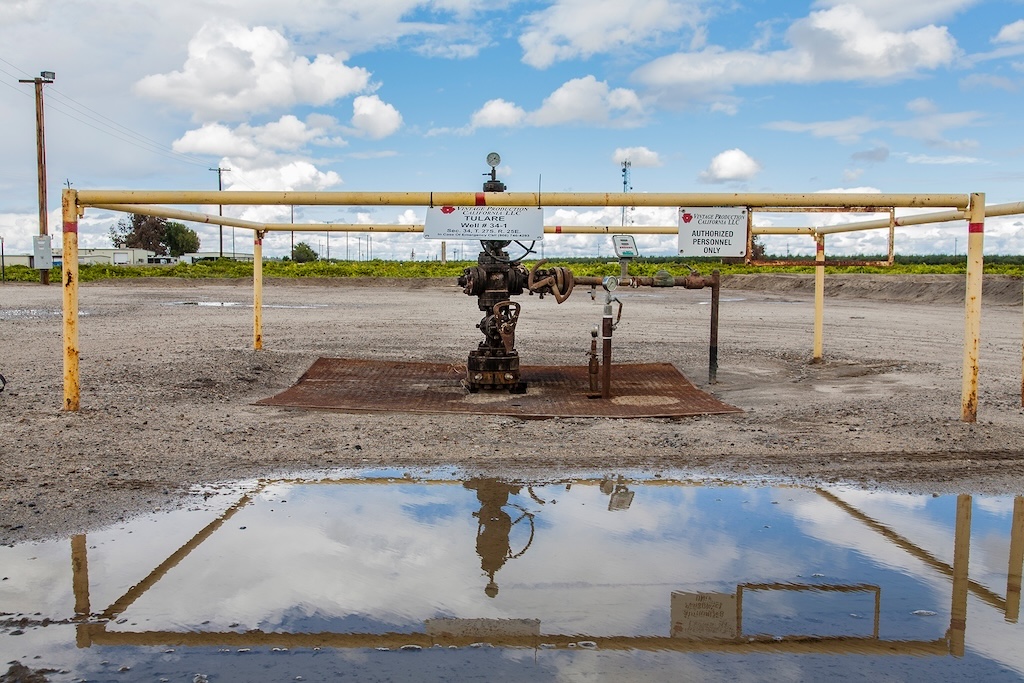An energy trade association that represents and promotes gas boilers and manufacturers is behind a barrage of negative press attacking heat pumps, DeSmog has learned.
Over the past two years, the Energy and Utilities Association (EUA) has paid a public affairs firm to generate hundreds of articles and interviews to lobby the UK government on energy policy.
The PR campaign subjects heat pumps to intense criticism. Powered by electricity, heat pumps are currently set to play a key role in decarbonising heating and replacing gas boilers, which heat around 85 percent of Britain’s homes and account for 15 percent of greenhouse gas emissions nationwide.
Negative stories about electric heat pumps have featured in outlets such as The Sun, Telegraph and The Express, in which damning headlines dub the technology “Soviet-style”, “financially irrational” as well as “costly and noisy”. Broadcast media has amplified similar messages on BBC 2’s Newsnight, LBC, TalkTV and GB News.
The company driving this coverage is the Birmingham-based WPR Agency, which was hired by the EUA to deliver an “integrated PR and social media campaign” to “help change the direction of government policy”.
On its website WPR said it aimed to “spark outrage” around heat pumps. This wording, along with other phrases, has since been altered to read “spark conversations” following a request for comment on this article from DeSmog.
The group has since lobbied to delay government plans to ramp up heat pump installation targets in a consultation that closed in June.
WPR’s campaign also explicitly promotes hydrogen as a viable fuel for domestic heating. While favoured by the gas and installers industry as it can flow along existing infrastructure, neither the UN’s leading climate body the Intergovernmental Panel on Climate Change (IPCC) or 32 recently reviewed independent studies see a major role for hydrogen in decarbonizing homes.
Much of the media coverage about heat pumps features Mike Foster, a former Labour MP and the chief executive of the Energy and Utilities Association trade body. According to the group, its members carry out around 98 percent of the UK’s heating installations. The vast majority of these are for gas boilers, though some of its members have also branched out into heat pumps.
WPR has sought to enhance both the image of Foster and EUA. The agency takes credit on its website for 32 media hits criticising heat pumps since June 2021 (described as a ‘snapshot’ of results by the firm). Foster is quoted in 90 percent of this coverage.
According to DeSmog’s analysis of google news – taking in tabloids, broadsheets, broadcast media and select trade press – this would mean the PR agency has generated two thirds of the high-profile negative content published about heat pumps in the 23 months to April 2023.
With targets now set for the phase-out of gas boilers in countries across Europe, in recent years, gas companies in the UK and the EU have lobbied hard for hydrogen over heat pumps – the model which offers the least disruption to their business model.
“The people who are pushing for hydrogen heating aren’t genuinely interested in tackling climate breakdown – they’re looking for a lifeline for the gas industry,” says Sarah Becker of Global Witness. “They aren’t just talking up a false climate solution, they’re also working hard to undermine the right ones,” she adds. “Heat pumps will play an essential role in reducing our fossil fuel dependence and making our homes and buildings renewables-ready.”
Energy expert Professor Martin Freer puts the UK’s ‘glacial’ uptake of heat pumps – the lowest in Europe – in part down to a lack of clarity for consumers. “The homeowner is confused by the mixed messages from government, industry and the sector around which low-carbon heating solution is best,” says the director of the Birmingham Energy Institute. “This same confusion does not exist in countries such as Italy and Poland and even France, Germany or the Netherlands.”
Responding on behalf of WPR, the lawyer Jonathan Coad said hydrogen was “an entirely viable means of providing an ‘efficient and low-carbon heating alternative’ to gas boilers”, stating that WPR was simply “raising the disadvantages of heat pumps, about which scientific and ecological opinion is clearly divided”.
Foster said: “There is no anti-heat pump campaign funded by EUA”, adding that the WPR “merely provides outsourced media support for our organisation”. He said neither he nor the EUA are outright opposed to heat pumps and support “the right appliance for the right home”.
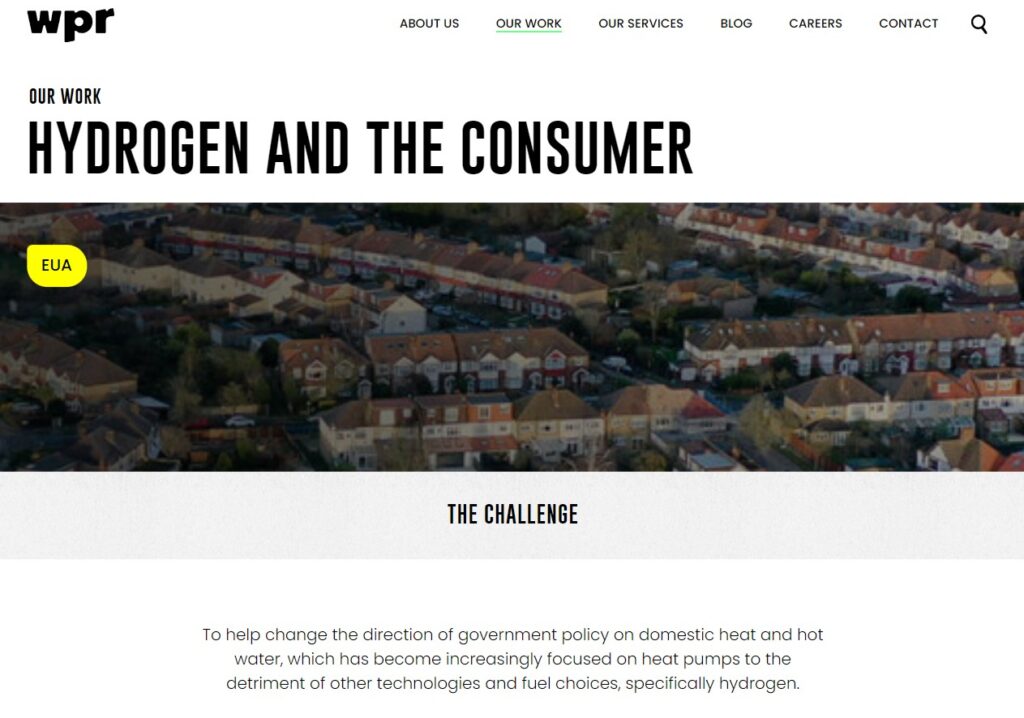
Future of Heat
In order to hit national climate targets and slow global heating, governments need to slash greenhouse gas emissions from buildings, which account for over a third of the EU’s energy consumption.
UK government research has found heat pumps to be three times as energy efficient as gas boilers, and plans to install 600,000 of the devices per year by 2028.
The future of hydrogen in heating homes in the UK is less assured. The House of Commons’ Science and Technology Select Committee has determined that low carbon hydrogen will at best have a limited role in heating homes.
This echoes the view of the 2022 report from the IPCC – which cited over 18,000 studies. It saw at best “a very modest role for hydrogen” in buildings by 2050, citing a “much higher delivered cost of heat” compared to heat pumps, along with safety and performance concerns associated with hydrogen.
Hydrogen can be made in a number of ways – some of which are more polluting than others. “Green hydrogen” is made from solar and wind power, while “blue hydrogen” is made using natural gas, in a process that involves capturing and storing methane’s carbon dioxide emissions (CCS), however this technology was described as “minimal or non-existent” in a 2021 report by Manchester University’s Tyndall Centre.
While green hydrogen is widely accepted as necessary for decarbonising heavy industry and some other sectors – where greenhouse gas emissions are harder to remove – it is not considered viable for heating homes.
A peer-reviewed assessment of over 30 independent studies in 2022, concluded that hydrogen use in domestic heating is inefficient, costly and resource-intensive compared to other low-carbon options such as heat pumps.
“Green hydrogen will always be 2 to 3 times more expensive, and this will always be the case independent of any technology improvements. It’s fundamental physics,” explains Simon Roberts, Honorary Professor at Brunel University’s Resource Efficient Future Cities Research Centre. “Hydrogen should only be considered where there is no alternative. For example, long distance, heavy transport, such as ships, large planes and some trucks.
Another hitch with hydrogen is that there may simply not be enough green hydrogen available due to the energy required to make it. It would require the installation of 2 to 3 times more renewable energy, which could be better used elsewhere.
“Not only is this a high expense but expansion of renewable energy generation won’t be able to keep up with the switch from fossil fuels, additional demand of electric vehicles and additional demand of hydrogen production,” Roberts says.
The government is due to announce a hydrogen village trial in Redcar, North Yorkshire later this year to assess whether to introduce hydrogen blending – a mix of green hydrogen and gas – in the National Grid from 2026. The Redcar trial has proved controversial after a gas company’s PR offensive in the town, documented by DeSmog, and concerns over safety and environmental damage. Hydrogen trials due in Whitby, Cheshire have been cancelled in the face of local opposition.
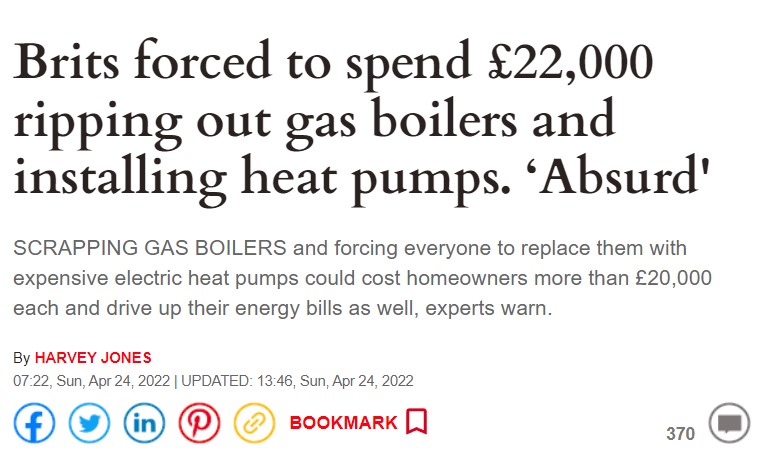
‘Financially Irrational’
Despite the overwhelming scientific consensus on the cheapest, most efficient route to decarbonisation of home heating, the EUA holds a different view.
The WPR’s campaign blurb claimed it “took on the heat pump lobby by highlighting the high installation cost and disruption of heat pumps”, which it said had “become increasingly focused on heat pumps to the detriment of other technologies and fuel choices, specifically hydrogen.”
After DeSmog approached WPR for comment, the wording was edited on the company’s site. The original page, archived by DeSmog, stated “took on the heat pump lobby”, which was changed to “challenged the prevailing narrative” while the phrase “spark outrage” was softened to “spark conversations”.
The PR campaign run by WPR Agency has exploited genuine concerns around the high upfront cost of heat pumps to generate consistently negative headlines, while boosting the profile of hydrogen blending in the energy mix – without raising any concerns or drawbacks associated with the fuel.
This technique of “paltering” – using statements that are technically true but omit crucial information and are therefore misleading – are a well used tactic of anti-environmental movements in the US. These “delay” arguments on climate change often focus on economic cost and appeals to social justice.
Foster, who represented the constituency of Worcester from 1997 to 2010, is quoted in dozens of trade and national media titles criticising the technology.
After energy bills rocketed in the wake of Russia’s invasion of Ukraine in February last year, Foster labelled the act of buying a heat pump as “financially irrational” in a paid-for opinion piece in Politics.co.uk, a publication targeted at Westminster insiders.
Foster refers repeatedly on Twitter to the “heat pump cult”. In an op-ed for The Telegraph in January (‘Heat pumps for all’ is a cult that the Government should abandon), he argues that for “the vast majority of homes, already on the gas grid, keeping your boiler and changing the gas to hydrogen, is the most feasible way forward”.
In an interview with The Express in February this year, he described the Boiler Upgrade Scheme, which awards a £5,000 grant to heat pump buyers, as a “sick dog” that should be “put down”.
The government’s rollout of the devices so far has been widely viewed as chaotic, with widespread criticism of the low uptake of the scheme and inadequate subsidies.
Heat pumps perform best when they are installed in well-insulated homes, which prevents warm air from leaking through cracks, gaps and cavities. The government is lagging behind on its insulation scheme, which Fuel poverty charity National Energy Action in April characterises as slow and poorly targeted.
But critics say concerns over heat-pump schemes have been misused. Despite subsidies that are higher than those awarded in many European countries, the UK installed just 60,000 in 2022 compared to 200,000 in Poland and Italy, according to Martin Freer.
Caroline Lucas, Green Party MP, said that the UK government’s roll-out of heat pumps had been “shambolic enough” without unnecessary media attention from a trade association, funded by members with an interest in preserving the status quo.
“What’s certainly not needed is the dirty fossil fuel lobby further undermining the credibility of heat pumps in favour of gas-powered hydrogen, simply to allow the continued use of climate-wrecking fossil fuels,” Lucas told DeSmog.
WPR has run a number of overlapping campaigns for the EUA, its various divisions and members.
For the EUA trade association’s heating and hotwater division (“Heating & Hotwater Industry Council”, or HHIC) the PR agency promoted ‘hybrid heat pumps’ for domestic heating – air source heat pumps that run alongside gas boilers – as part of its 2021 “Heating up to Net Zero” campaign. A briefing produced by members called on the government to promote hybrid heat pumps, which are heavily promoted by the gas industry as less carbon intensive than gas boiler, but experts say only provide a further way to prolong the use of planet-heating gas.
The WPR was also hired by the EUA and HHIC to generate coverage for its ‘Heat Pump Installer Shortage’ campaign, for which it landed stories in the Telegraph and City AM.
WPR – which also includes Baxi, Worcester Bosch and Cadent among its clients – also ran an additional campaign on behalf of the EUA, titled Moving the Dial on Hydrogen, which helped to produce the ‘Too Close To Home’ briefing. The document drew attention to the high price of heat pumps, critiqued long installation times, and polled high support for ‘low carbon gas boilers’, including those partly powered by hydrogen. According to WPR, the hydrogen campaign produced “national hits” in mainstream media with a Twitter campaign reaching the Mayor of London Sadiq Khan and Kwasi Kwarteng, the former business and energy secretary.
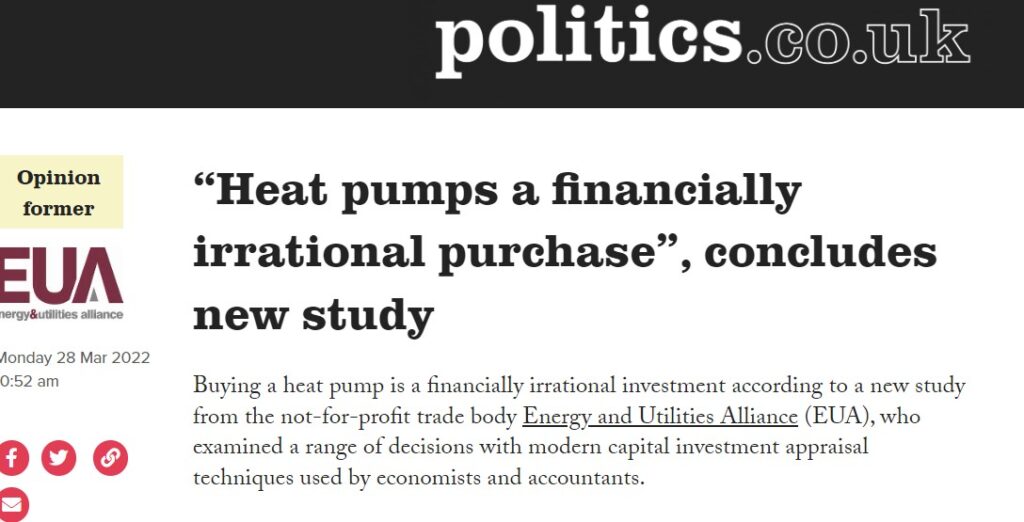
‘Technology Agnostic’
The EUA is made up of over 280 members active in the UK’s energy trade sector, with seven umbrella divisions representing the heating, hot water, utility, gas vehicle, and radiator industries. The organisation says it “acts on its members’ behalf to shape the UK’s decarbonisation policy whilst being mindful of affordability and security of supply”.
“Based on its name, you might think the Energy and Utilities Alliance represents both electricity and gas utilities, but you would be wrong,” Michael Liebreich, energy analyst and founder of Bloomberg New Energy Finance, told DeSmog. “It’s a gas industry association, as you can see from its list of members.”
EUA’s members include some of the gas industry’s biggest names. Gas distribution companies SGN, Northern Gas Networks, Wales and West Utilities and Cadent – the UK’s largest gas distributor with 11 million customers. All these distributors advocate for the blending of hydrogen into the UK gas grid.
Also present is National Gas, the owner of Britain’s gas network. On its website, the company – which owns and operates the UK’s 7,600km-long network of gas pipelines and maintains seven million gas meters – expresses its ambition to deliver a “hydrogen backbone” for Britain.
Boilermakers Worcester Bosch and Baxi, who are also members, both promote and market “hydrogen-ready” boilers as a “carbon-free fuel source” while Vaillant – which sells boilers, as well as other heating systems – backs hydrogen as “the future fuel for boilers”.
While some of the EUA’s member companies, including Baxi, Valliant and Wolseley, also provide heat pumps, these make up a tiny fraction of their current business.
The UK’s primary electricity distribution networks – including UK Power Networks and Northern Power Grid – are notably absent from the membership, along with electricity transmission operator National Grid.
The EUA appears to back hydrogen in its policy strategy, sponsorship and on its website. The association sponsors the prestigious Institution of Gas Engineer and Managers’ annual gas industry awards and is also a co-sponsor of the cross-party informal parliamentary group (APPG) for hydrogen, alongside EUA members Baxi, Bosch and Cadent.
The EUA champions hydrogen as a viable domestic fuel in reports, articles and events. The association enthusiastically promoted Hydrogen Week in February, and its most recent manifesto in 2019 listed “Greening the gas grid with the aim of 99 percent hydrogen before 2050” as a top priority.
On the EUA’s website, multiple articles promote the blending of hydrogen with gas for home heating, and Foster regularly blogs on the subject. Foster acknowledges a limited role for heat pumps in just one post, in October 2021, for homes that already run solely on electricity.
Foster told DeSmog that both he and the EUA had a “technology agnostic” approach. “We support the right appliance for the right home, some will be heat pumps, some connected to heat networks and we believe some connected to a hydrogen gas network,” he told DeSmog.
Any suggestion that the organisation is anti-heat pump is “wide of the mark, indeed outright wrong”, he said.
But the only EUA-sponsored stories that WPR has chosen to highlight on its site are negative stories about heat pumps.
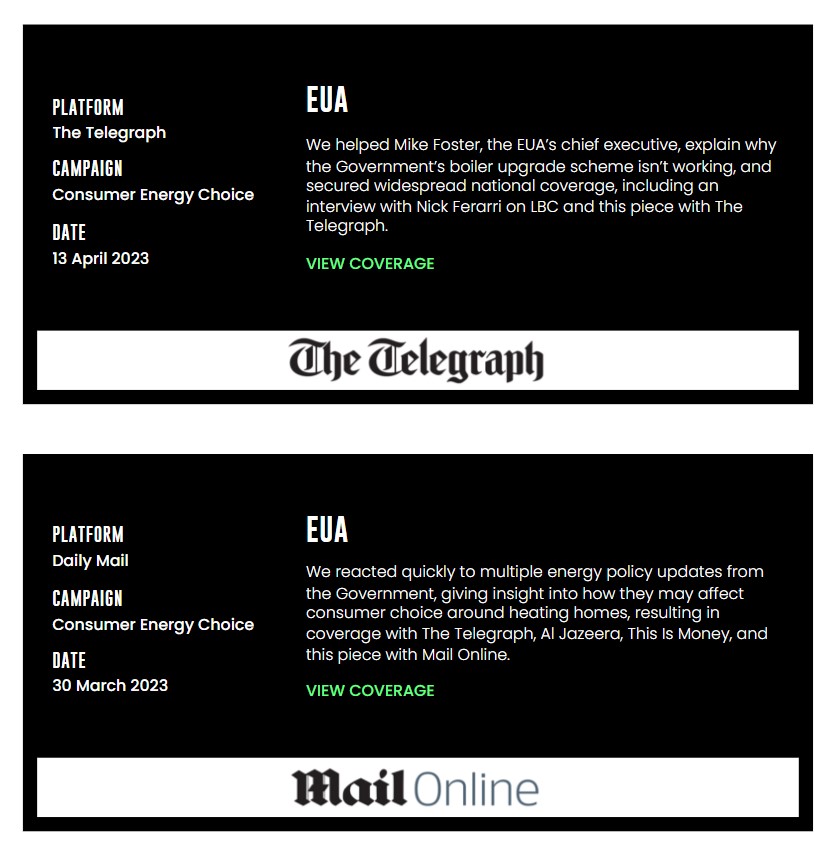
Hydrogen Champion
In April, Foster was on seen canvassing for Worcester’s Labour parliamentary candidate, Tom Collins – who is also the hydrogen development lead at Worcester Bosch, one of the EUA’s members.
When asked by DeSmog if this presented a conflict of interest, Foster told DeSmog that as a Labour Party member of 40 years “it would be strange if I did not support his election campaign”.
As well as closely following the events and activities of the Hydrogen APPG, Foster has spoken at the all-party parliamentary group for Energy Costs, including at an event in March on “decarbonising heat”.
In late April Foster attended a meeting with Energy Security and Net Zero Secretary Grant Shapps along with MPs Emma Hardy, Karl Turner and Shaun Edwards, the chief executive of Ideal Heating. A government spokesperson said the meeting was “to discuss the clean heat market mechanism and progress regarding the installation of heat pumps”.
Foster told DeSmog the meeting was “at the invitation of the three Hull Labour MPs, who wanted to represent their GMB unionised workforce, given my expertise in the heating area, in a local issue”.
The meeting took place during a consultation on a proposed mechanism to incentivise heat pumps, which closed June 8. In it, the government sets out a mandate for the UK’s fossil fuel boiler manufacturers to sell a rising proportion of heat pumps from next year.
A leaked draft response seen by DeSmog that was submitted by the EUA body, the Heating and Hotwater Industry Council, proposes delaying the mechanism until 2026. The plans were “misguided”, the response stated, and would “push UK manufacturers out of the UK and directly lead to significant job losses”.
Foster told DeSmog that it would be “perverse” for the EUA to fund an anti-heat pump campaign. He added that he authorised heat pump installations in his capacity as chair of Affordable Warmth Solutions – a company that administers a government energy support fund – and also through the EUA itself.
“We support a range of technologies – heat pumps, heat networks and hydrogen and yes, we campaign for that outcome for the consumer, who we believe should have a choice about future home heating,” he said.
Despite the prohibitive cost of heat pumps in the UK (an average of £10,000), the number of homes installing one has grown by around 10 percent month-on-month, according to new research published in early May by the energy and climate think tank Energy and Climate Intelligence Unit (ECIU).
Writing in the New Statesman in February this year, the analyst Jan Rosenow, director of European programs at the Regulatory Assistance Project (RAP) of clean energy experts, identified three ingredients to fix the UK’s heat pump problem: reform the tax system to better reward environmentally friendly options, set clear dates for fossil fuel phase out to provide market certainty and spark investment – and communicate better about heat pumps and how they work.
Responding to DeSmog’s findings, Michael Liebreich said: “I would love to know the reasons for Mike Foster’s relentless boosting of hydrogen – is it because his members are pushing him in that direction?
“None of his campaigns will have the slightest impact on the eventual outcome; as Nobel prize-winning physicist Richard Feynman said: “For a successful technology, reality must take precedence over public relations, for Nature cannot be fooled.”
But the delay will cost the climate dearly. “Every year of confusion and delay is a year Foster’s members don’t have to invest in new business models,” reflects Michael Liebreich. “And if hydrogen heating doesn’t work – which of course it won’t – so be it, and shame about the planet.”
DeSmog co-published a version of this article with The Guardian
Editing by Hazel Healy
Additional research by Michaela Herrmann and Joey Grostern
Subscribe to our newsletter
Stay up to date with DeSmog news and alerts





